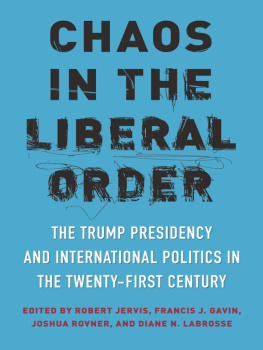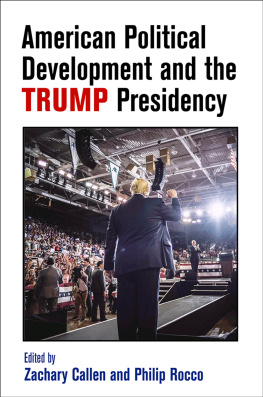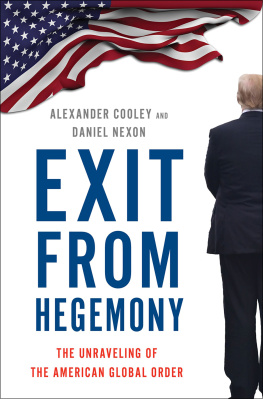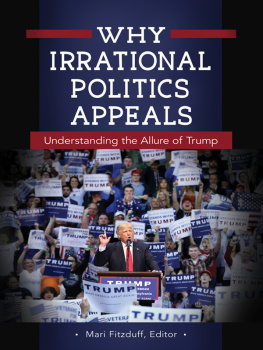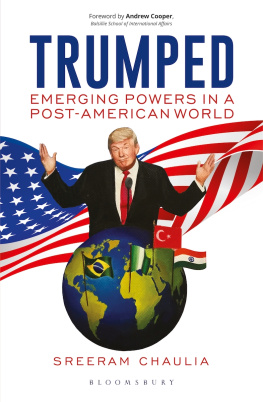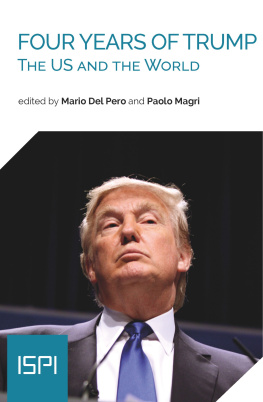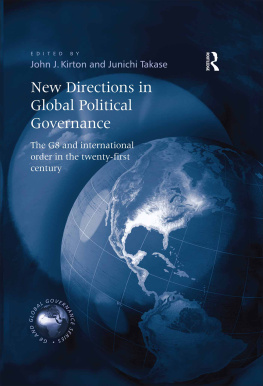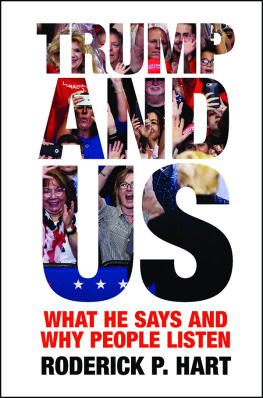Table of Contents
CHAOS IN THE LIBERAL ORDER
CHAOS IN THE LIBERAL ORDER
THE TRUMP PRESIDENCY AND INTERNATIONAL POLITICS IN THE TWENTY-FIRST CENTURY
EDITED BY ROBERT JERVIS, FRANCIS J. GAVIN, JOSHUA ROVNER, AND DIANE N. LABROSSE
WITH GEORGE FUJII
Columbia University Press
New York
Columbia University Press
Publishers Since 1893
New York Chichester, West Sussex
cup.columbia.edu
Copyright 2018 Columbia University Press
All rights reserved
E-ISBN 978-0-231-54778-9
Library of Congress Cataloging-in-Publication Data
Names: Jervis, Robert, 1940-editor.
Title: Chaos in the liberal order : the Trump presidency and international politics in the twenty-first century / edited by Robert Jervis, Francis Gavin, Joshua Rovner and Diana N. Labrosse; with George Fujii.
Description: New York : Columbia University Press, 2018. | Includes index.
Identifiers: LCCN 2018000801 (print) | LCCN 2018006707 (e-book) | ISBN 9780231547789 (e-book) | ISBN 9780231188340 (cloth: alk. paper)
Subjects: LCSH: United StatesForeign relations2017 | Trump, Donald, 1946 | World politics21st century.
Classification: LCC JZ1480 (e-book) | LCC JZ1480 .C454 2018 (print) | DDC 327.73dc23
LC record available at https://lccn.loc.gov/2018000801
A Columbia University Press E-book.
CUP would be pleased to hear about your reading experience with this e-book at .
Cover design: Mary Ann Smith
CONTENTS
ROBERT JERVIS, FRANCIS J. GAVIN, JOSHUA ROVNER, AND DIANE N. LABROSSE
ROBERT JERVIS
MICHAEL N. BARNETT
RANDALL L. SCHWELLER
STEPHEN M. WALT
JOSHUA BUSBY AND JONATHAN MONTEN
STEPHEN CHAUDOIN, HELEN V. MILNER, AND DUSTIN TINGLEY
BRIAN RATHBUN
ROBERT Y. SHAPIRO
STEPHEN WERTHEIM
THOMAS W. ZEILER
JOHN A. THOMPSON
T.G. OTTE
JONATHAN SPERBER
RYAN IRWIN
DANIEL BYMAN
ANDREW J. BACEVICH
STANLEY R. SLOAN
JENNIFER LIND
TOM LONG AND MAX PAUL FRIEDMAN
JAMES R. STOCKER
F. GREGORY GAUSE, III
ROBERT LEGVOLD
PRISCILLA ROBERTS
WILLIAM R. KEYLOR
MARK PHILIP BRADLEY
SAMUEL MOYN
LEO P. RIBUFFO
SAM LEBOVIC
JOHN SCHUESSLER
NANCY MITCHELL
ARTHUR ECKSTEIN
FRANK NINKOVICH
ROBERT JERVIS, FRANCIS J. GAVIN, JOSHUA ROVNER, AND DIANE N. LABROSSE
E very era seems particularly turbulent to those who live through it, but this is not the entire explanation for the widespread feeling that the current world is uniquely unsettled. Because the United States remains central to so much of world politics, new developments there are likely to ramify throughout the international system. Both President Donald Trumps defenders and his detractors agree that he is unusual, and even scholars who doubt that he will translate the bulk of his rhetoric and attitudes into policies expect some significant changes. Thus, although it is still early in his presidency, it is not premature to gather a set of essays dealing with Trump and the changing world he and the United States confront.
The historical perspective situates current politics with those of the past, and so can address whether and how much the Trump phenomenon differs from other foreign policy upheavals. The theoretical perspective helps define the meaning of Trumps impulses, if that is possible. Do his Tweets represent some foundational turn in American grand strategy? Do they announce the end of the decades-long American commitment to leading the so-called liberal international order? Or are they simply the product of a scattershot approach to policy by a leader who revels in transactional politics, hates the idea of being tied to a single point of view, and believes that cultivating a reputation for inconsistency and uncertainty is a good way to gain bargaining power?
Trump is not the only, or perhaps even the main, new and disruptive element in our world. It is likely no accident that the same year that saw his election also saw the British vote to leave the European Union (Brexit), the increasing strength of right-wing populist movements in several European countries, and greater authoritarianism in various eastern European countries as well as in China and Russia.
A few years ago, even observers who were not normally given to optimism believed that our political world was on a different trajectory. Even though the attempt to establish democracy in Afghanistan and Iraq did not succeed, and the Arab Spring faltered, the general tide was toward liberal democracy. Economic and political integration in Europe, which appeared to be a center of stability and perhaps a model for much of the world, seemed on track to continue. The American role in the world, although diminished by the over-assertiveness of President George W. Bush and perhaps by the excessively relaxed style of President Barack Obama, was central, and was viewed as benign by many global leaders and significant segments of world public opinion. Although there were pressing problems without apparent solutions, including the civil war in Syria, terrorism, sluggish economic growth in the developed countries, and the looming menace of environmental degradation and climate change, many of the mechanisms designed to at least ameliorate these problems, and much of the necessary leadership and public support for these efforts, seemed secure.
No longer. As in much of social life, a prime rule of politics seems to be that it is easier to destroy than to build. This is clearly true of the structures for international cooperation and for the trust and the implicit norms that underpin them. It is especially worrisome for advocates of the liberal order, who believe it has been a powerful antidote to the preWorld War II politics that turned rising powers into predators and led to global catastrophe. An interlocking system of international institutions, buttressed by powerful norms, enabled deep levels of cooperation among states. Faith in a rules-based order took the edge off anarchy, even though no world government was possible. Those states that participated in this framework and observed the rules benefited greatly, cooperating on a range of issues in ways that would have been difficult or impossible in the era before respect for institutional dispute resolution was accepted as normal and appropriate. Indeed, faith in the order was so deep that in some respects it became second nature. Not all leaders were equally enthusiastic about international norms and institutions, but few of them really challenged the liberal order itself. The result was a long period of relative harmony among states with a long history of acrimony, conflict, and war.
If this vision is correct, Trumps rise is a threat. His happy-go-lucky disregard for basic norms, and his gleeful challenge to the old shibboleths of postwar diplomacy, may do serious and lasting damage. His call for a transactional style of politics stands in direct contrast to the logic of international institutions, which are supposed to address the problem of transaction costs. Put another way, peace and prosperity are possible because states do not have to negotiate every deal from scratch. They have faith in the international laws and norms that have accumulated over decades. They trust each other. Trumps rhetoric is an attack on the foundation of that trust.

